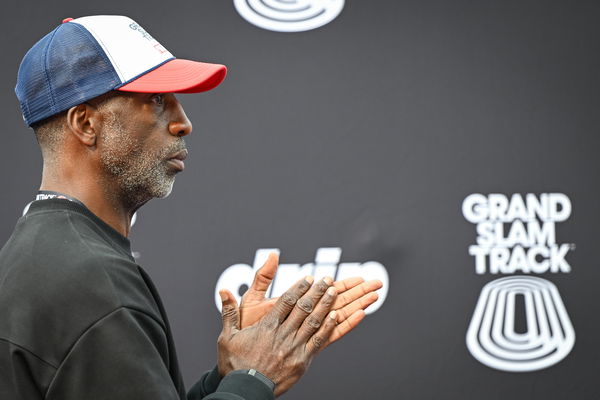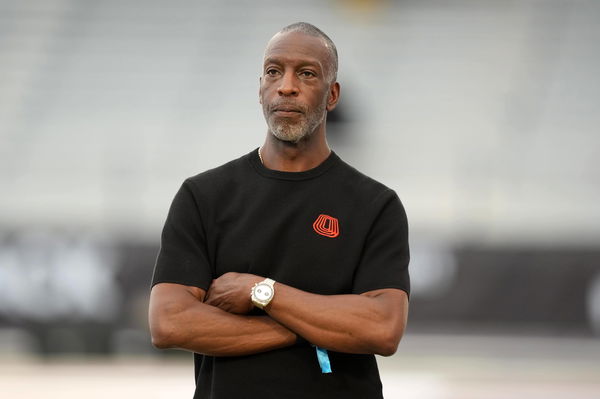
Imago
Credit: X

Imago
Credit: X
The final leg of Grand Slam Track, Michael Johnson’s ambitious new league, was abruptly withdrawn from the calendar. What was supposed to be the season’s climax in Los Angeles never materialized, as organizers cited shifting economic conditions. Into this atmosphere of uncertainty stepped Canadian sprint star and four-time Olympian, who did not hide his unease about where the project is heading.
Watch What’s Trending Now!
The inaugural GST season launched in Kingston with modest ticket sales, followed by two additional meetings in Miami and Philadelphia. While those three events were staged, the decision to abandon the Los Angeles finale at Drake Stadium exposed the fragility of the enterprise. Johnson, as founder and commissioner, has stressed that the focus must now be on preparing for 2026, and he has indicated that new investors are expected to join. Yet Aaron Brown’s perspective, shared in conversation with CBC Sports host Perdita Felicien, suggests that the immediate concern should be less about future promises and more about addressing unfinished obligations.
ADVERTISEMENT
Brown did not mince words. “Get his ducks in a row,” he said, warning that unanswered questions about missed dates and unpaid commitments cannot be overlooked. He added while in conversation with CBC Sports, “You don’t want to be out all this money, be someone who’s like, ‘Hey, where’s the bread? You know, when are we going to get paid up? You’re missing dates and stuff and you’re already talking about 2026.’” In his view, the only way to protect the league’s reputation is to repair the damage first. “Do some damage control and, you know, repair their image a little bit,” he explained, urging Johnson to reassure those who had carried the league in its first year.
Yet his criticism was not limited to a warning. Brown also acknowledged that the product itself showed signs of viability. “When there’s a will, there’s a way. And it might seem unfathomable right now, and his back’s against the wall for sure, but if you can sell people on the vision before when he was pitching to investors, there was this is just all concept, this is all just theoretical, there is a proven product that has been put in place,” he explained.
ADVERTISEMENT
Aaron Brown noted that while the final meet collapsed and financial obligations remain unsettled, the actual presentation of the competitions had merit. “I think it was still an entertaining product and all you need is the right backers,” he continued, suggesting that the withdrawal of a key investor was decisive in undermining this first season.
ADVERTISEMENT

Imago
Grand Slam Track In Philadelphia – Day Two PHILADELPHIA, UNITED STATES JUNE 1: American former Olympic champion sprinter Michael Johnson, the founder and CEO of Grand Slam Track Series is seen during Day Two of the Philadelphia event at Franklin Field in Philadelphia, Pennsylvania, United States, on June 1, 2025. Philadelphia United States PUBLICATIONxNOTxINxFRA Copyright: xSTRx originalFilename:str-grandsla250601_npHJk.jpg
For Johnson, the path to 2026 now involves both reassurance and reinvestment.
Brown argued that the league’s structure and vision need not be discarded, but the leadership must demonstrate credibility. “If that one investor didn’t back out, I don’t think we’d be talking about Grand Slam as a failure,” he emphasized that the model itself is not inherently flawed.
ADVERTISEMENT
The challenge is whether Johnson can restore confidence among athletes, investors, and spectators before attempting to relaunch. In Brown’s estimation, the league will be judged not by lofty announcements about 2026, but by whether it resolves the unfinished business of 2025.
Meanwhile, Michael Johnson addressed Grand Slam Track’s unpaid obligations, admitting delays and pledging repayment before the league resumes.
ADVERTISEMENT
Michael Johnson confronts missed payments as Grand Slam Track’s future hangs in the balance
Michael Johnson has spoken directly to the growing concerns around Grand Slam Track’s financial difficulties, using his Instagram account to acknowledge the league’s failure to meet obligations to athletes and vendors. In his words, “Due to our strong desire to make this right as quickly as possible, we offered dated payment timelines and have been unable to meet them.” He admitted that these missed commitments have caused frustration and damaged confidence. To be fair, he addressed the matter with a tone that suggested both responsibility and urgency.
ADVERTISEMENT

Imago
Track & Field: Grand Slam Track Miami May 3, 2025 Miramar, FL, USA Michael Johnson at the Grand Slam Track Miami at Ansin Sports Complex. Miramar Ansin Sports Complex Florida United States, EDITORIAL USE ONLY PUBLICATIONxINxGERxSUIxAUTxONLY Copyright: xKirbyxLeex 20250503_szo_al2_0116
He explained that the decision to cut the season short was intended to prevent further losses while working with the league’s board and investors to address what he called “obligations.” Johnson insisted that his immediate focus is on clearing the outstanding payments before any plans for the future can resume. He conceded that trust has been compromised, noting that some now question whether the league’s vision can endure. Rather than denying the scale of the problem, he framed the current moment as one where concrete systems must be established to prevent repetition of the same mistakes.
Despite the gravity of the situation, Johnson rejected the idea that this signals the conclusion of the project. He stated plainly that the 2026 season will not move forward until debts are settled, but he added that this does not mark the end of Grand Slam Track. By situating repayment as the central priority and making public his intent to put stronger partnerships in place, Johnson sought to assure athletes and stakeholders that the enterprise still has a path forward, provided it addresses its shortcomings with clarity and accountability.
ADVERTISEMENT
ADVERTISEMENT
ADVERTISEMENT
ADVERTISEMENT